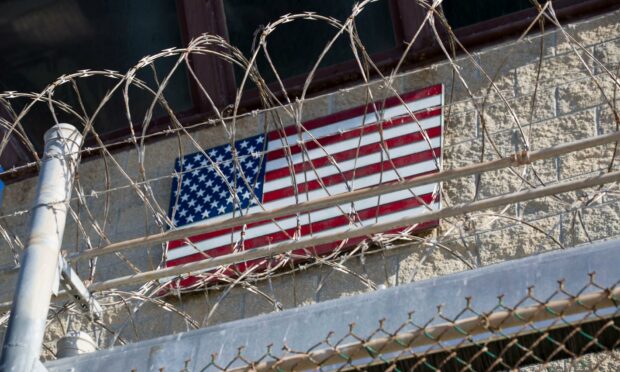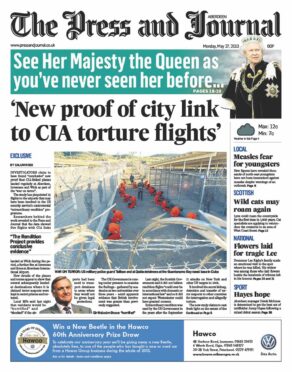Leading academics fear Scotland’s international standing has been hurt by its failure to uncover the truth about the CIA’s use of local airports for “torture flights”.
Experts say it is “incredibly frustrating” that the investigation into Scotland’s links to the illegal transfer of US suspects during the War on Terror remains ongoing after a decade.
They fear the full extent of the UK’s knowledge and involvement in the torture of US detainees in the wake of the 9/11 terrorist attacks might now never be made public.
Scotland’s former Lord Advocate Frank Mulholland ordered a police inquiry into the US government’s “extraordinary rendition” flights in June 2013.
That move came just days after the Press and Journal revealed CIA planes were likely to have used Aberdeen, Inverness and Wick airports as stop-offs during operations.
The P&J had contacted Ruth Blakeley and Sam Raphael, directors of the ground-breaking Rendition Project, who were compiling a database of flights suspected to have been used by the CIA for the illegal transfer of terror suspects.
After we asked them to review flight data at the three airports, the researchers found “conclusive” proof five CIA planes connected to rendition had landed at both Inverness and Wick, with a further three at Aberdeen International Airport.
Dozens of suspicious flights were also linked to other airports across the country, including six at the former RAF Leuchars base in Fife and two at Dundee.
Dr Raphael, reader in international relations at Westminster University, said the launch of Scotland’s police inquiry 10 years ago had been “pretty remarkable and unique”.
He said: “It did signal that Scotland was able to, and interested in, taking full account about what had taken place, and getting to the bottom of the matter, and where necessary, saying hard truths.
‘Hopes were really high’
“Hopes were really high on the back of that, in an area where, across the globe, accountability and truth has been really hard to establish.”
The police’s organised crime and counter terrorism unit investigated the claims for six years, before sending a report to the Crown Office and Procurator Fiscal Service.
However, about four years on from receiving the dossier, a spokeswoman for the Crown Office has now confirmed the information is still “being considered”.
“As this is a live investigation it would not be appropriate to comment further,” she said.
Mr Raphael said: “Ten years later and nothing has happened. I mean, it does feel frustrating and it does feel disappointing.
“There’s a specific disappointment in the context of this, because hopes were high here that a different approach might be taken.”
He added: “I’m really concerned the full extent of the truth will never be known and the facts will be buried forever, and/or destroyed.”
Professor Blakeley, chair in politics and international relations at Sheffield University, also expressed dismay at the lack of progress.
“It’s incredibly frustrating but it’s also typical of this whole affair, on both sides of the Atlantic,” she said.
“I am concerned, and I’m concerned because I do think that this episode has actually eroded Britain’s and Scotland’s standing, in terms of defence of human rights.
“It’s very, very difficult for us to be lecturing other states about torture, non-compliance of human rights laws.
“It’s quite easy to point the finger, but plenty more repressive regimes than ours are very quick to use the example of the Afghanistan and Iraq wars, and the accompanying arbitrary detention and torture of prisoners, to say, ‘well you have no right to lecture us’.
“And it has actually eroded the capacity of the US and the UK, including Scotland, to mount a strong defence of liberal democratic norms, or particularly human rights.”
What is rendition?
Extraordinary rendition involved capturing and secretly moving terror suspects to foreign countries where they could be detained and interrogated without the legal protections they would have received in the US.
In December 2014, a report by the US Senate’s Intelligence Committee confirmed the CIA carried out “brutal” interrogations of al Qaida suspects in the years after the 9/11 attacks.
However, only an executive summary and 525 pages were released of the 6,000-page report, with the rest remaining classified.
Police in Scotland requested the full version of the report to help with their probe, but it was not handed over.
Former Lord Advocate James Wolffe said in 2018 that Police Scotland faced a “complex and challenging investigation”, with evidence “having to be sought and obtained from countries outwith the UK”.
In 2018, the Westminster parliament’s intelligence and security committee found that British agencies continued to supply intelligence to allies despite knowing or suspecting abuse in more than 200 cases.
However, the Tory government ruled out a judge-led inquiry into whether UK authorities were complicit.
Prof Blakeley said it was still vital for the public to be told the truth about the UK and Scotland’s links to extraordinary rendition flights.
“I think unless there is more transparency, more accountability, and a willingness to reckon properly with these things, we continue to be in a situation where we’ve lost that moral high ground, if you think we ever had much of it,” she said.
“I think that’s a real problem. I think there’s an erosion of international norms.
“It’s quite concerning how many authoritarian states are increasing their repressive stance on particular issues, whether that’s human rights or LGBTQ rights.
“It’s quite difficult to claw that back if we haven’t accounted for our own misdemeanors.”





Conversation